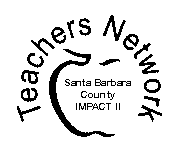The TeachNet Project sponsored with major funding by the AT&T Learning Network,
seeks to improve student achievement by providing training, grants, networking and resource sharing to teachers at four of the Teachers Network affiliates nationwide.


www.qad.com
Celebrating Traditions
Honoring
Our Ancestors
How
it works:
Celebrating Traditions is a unit that allows the students to research a topic and speak about it in front of an audience. It also encourages them to really put some thought and creativity into their work.
This unit is an extension of the Houghton Mifflin Reading third grade theme "Celebrating Traditions" used in the Santa Maria-Bonita School District. It goes more in depth into different cultures' ways of honoring their ancestors, and the traditions followed in their celebrations. In this unit the students use the internet to learn about several cultures' traditions on remembering their dead ancestors. The students then use different technologies to investigate and make a report on one of these traditions.
Although this unit is an extension of the Houghton Mifflin unit it can be a stand alone.
One of the goals of this unit is to bring previous experiences lived by the students into the classroom for sharing and validation. Another goal is to help the students learn more about their own cultures and to preserve their traditions. In this unit the students learn about the Day of the Dead celebrated in Mexico and other countries, Qing Ming celebrated in China, and Obon celebrated in Japan. They also investigate other similar celebrations around the world.
The most exciting part about this unit is the creation of the visuals for the report. Creativity is encouraged and there is a lot of leeway on how the report can be presented. Some of the ideas presented to the students include the traditional report with a poster or other prop, PowerPoint presentation, video, dance/song, newspaper article, newscast, pamphlet/brochure, etc.
The students particularly enjoy reading the booklets with feedback from their peers.
Assessment:
An assessment is used at the end of this unit to evaluate the students' success in investigating the topic and presenting it. The scoring system is found at the end of lesson five. For most other lessons teacher observation is used. All children will gain different skills and concepts from this unit. The best assessment is teacher observation. Some of the work from this unit can go into portfolios.
Standards:
Language Arts: mostly listening and speaking standards are addresses in this unit.
Estimated Number of Class Periods:
This unit can be expanded to take an entire year with weekly lessons in an intensive study of the local history, but it can also be done as a mini-unit in a month. The number of actual class periods used is minimal, but class time is needed for the students to complete the work. They need to have time to do the do research and to write up the new information they are finding in their research, as well as creating a web page.
Software or Materials Used:
Computer, Internet Connection, e-mailing capabilities, digital camera, video camera.
Keywords:
Traditions, celebrations, Day of the Dead, Obon, Qing Ming, ancestors
The Students:
The students that participated in this unit were 31 third graders, mostly second and third generation Hispanics (México - no other countries represented) and one Vietnamese. From 4 to 7 are advanced students (four identified as a GATE [Gifted And Talented Education] students, the others referred only), no resource students, 3 students with SSTs (Student Study Team). Half the students are bussed in from other neighborhoods.
For the lessons in this unit the students were group as a whole class or worked with individually (one-on-one). For some of the Internet activities they were in pair or small groups (3-5 students).
Most of my class was very adept at using the computer and the Internet. The rest of the class had some experience with computes and were not afraid to dive right in with few exceptions.
Overall Value:
This unit gives the students the opportunity to speak to an audience, give feedback, and to exercise their creativity in designing a presentation.
Details:
The major goals of this unit are:
Technology:
- to expose the students to the many uses of the Internet and encourage the use of "Netiquette" for safety and manners
- to expose the students to other technologies such digital photography and video
- to give the students practice in using tools appropriately (Technology)
- to teach the students how to create a report while encouraging them to use some form of technology
Academic areas:
- to provide the students with practice reading and writing in different genres, for different purposes
- to help the students learn grade appropriate listening and speaking skills
- to give the students opportunities to make choices and judgments
- to encourage students to share their ideas orally and in written form.
Subject Area: Language Arts and Social Studies.
Starting Grade Level: 3
Ending Grade Level: 8 (with modification)
Tips for the Teacher:
- Check out the websites before you need them because they are constantly changing.
- Select a hot list with the sites for the students to go to.
- Teach students to be "experts" in the different technologies, so that they can relieve the teacher from having to help all students individually
Name: Jessica N. Rivera
School: Ida Redmond Taylor
Jessica N. Rivera has been teaching in Santa Barbara County for The Santa Maria-Bonita School District since 1989. Her experience includes teaching kindergarten through third grade.
She earned her first teaching degree in México where she taught for a year before moving to the US. Later she earned an A.A. degree in Bilingual Cross-Cultural Studies at Ventura college, a B.A. in Art Studio at UCSB, a Bilingual Cross-Cultural Multiple Subject credential with emphasis in Spanish at UCSB, and most recently a master's degree in Educational Technology at Pepperdine University.